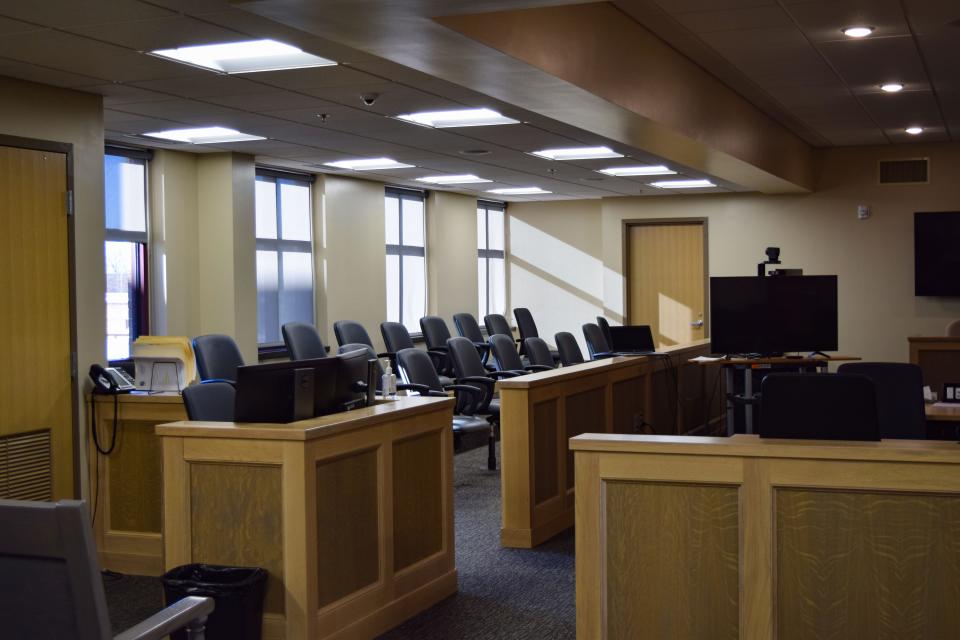SD Indigent Defense Taskforce considers statewide defense service commission
Members of a taskforce, meant to help find solutions when it comes to providing legal services for those who cannot afford a lawyer, believe one solution may lay in creating a statewide commission to assist certain cases.
The recommendation comes after a four-hour meeting Tuesday afternoon of the Indigent Defense Taskforce in Sioux Falls. Prior to the meeting, the state's Unified Judicial System held a series of listening sessions across South Dakota to gather input from defense attorneys, state’s attorney offices and county commissioners about issues they’ve identified with the system such as inadequate funding and access to resources.
Only three counties, Minnehaha, Pennington and Lawrence, have public defender’s offices. The rest of South Dakota’s 66 counties rely on court appointed attorney lists or county contracts with criminal defense lawyers.
More: Funding, experience needed for court-appointed criminal defense services in South Dakota
“We do all of this in a state with 66 counties that look at least 66 different ways and that trying to do something that advances those dual goals of efficacy and efficiency, something is going to have to give,” said Neil Fulton, the Dean of the University of South Dakota Law School.
Centralize appeals and habeas corpus cases
While no final recommendation was reached, the group did agree upon the idea of the possibility of a centralized commission where lawyers would handle appeals and habeas corpus cases on the behalf of their client.
Brent Kemempa, the deputy Attorney General, explained the AG’s office has an appellate division that focuses strictly on appeals. He said the office has at least 11 prosecutors focused on criminal appeals.

Traci Smith, the Minnehaha County Public Defender, and Wendy Kloeppner, the Lake County State’s Attorney, both liked the idea and agreed that appeals and habeas cases required an experienced attorney.
Could certain cases also be included in the commission?
Maybe.
Discussion primarily centered around the question of if there was a centralized commission of defender services and whether could the office help with serious felony cases.
Members spoke about the need to establish criteria that would determine if a lawyer was eligible to be considered and what could be considered a serious felony. There were also questions and multiple answers as to who would oversee such a commission, whether it be the state or several regional administrators, and who would fund it.
“If you’re wanting to take on some of these cases, they’re intense and there’s a lot of information,” said Eric Whitcher, the Pennington County Public Defender. “I think there should be some trainings developed on how to handle it.”
Fourth Circuit Court Judge Michael Day said in serious felony cases, such as murders or rapes, he wants to know the lawyer he’s appointing to the case.
More: Arkansas ruling on gender-affirming care ban could have implications in South Dakota
“We’ve all had this discussion today about how important it is that they have the passion, the training and the experience, but who are they going to be?” Day asked.
Some like Kloeppner took inspiration from Beadle County, where a group of defense lawyers share a contract with the county to provide defender services. The group decides which lawyers are assigned cases and the competency of the lawyer.
Kloeppner said by having a similar board who would create a list of competent and trained attorneys for the commission could answer a judge’s question about who would represent the defendant.
Sen. Jim Mehlhaff, R-Pierre, said there was merit to having a statewide defender service that could set standards and provide training.
More: Sioux Falls City Council to vote Tuesday on 4 years of utility rate hikes
As for funding the potential commission, Greg Sattizahn, the state court administrator for UJS, said it would make sense for the state and counties to both provide funding.
“I think we should think of funding as coming in to support the overall structure to assist counties with a portion of their bills or the state picks up a portion,” he said.
He added the commission could be administered by the UJS, with seven different administrators reflecting the seven state circuit courts.
“But to create that structure seven times, I think could be challenging because some of them have to assume that administrative responsibility and so you would probably have at least seven of those folks,” Sattizahn said.
The taskforce meets again at the end of July to discuss what other states have done in creating statewide defender services programs and what may work for South Dakota.
This article originally appeared on Sioux Falls Argus Leader: SD Indigent Defense Taskforce considers statewide service commission

